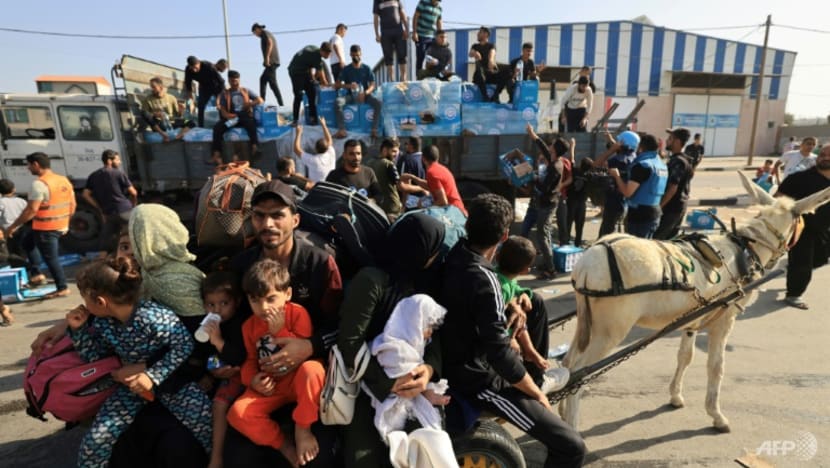‘We are seeing the collapse of the humanitarian system in Gaza’: UN human rights chief
Israeli forces and Hamas militants have clashed for two months in the Gaza Strip, killing thousands of people and wiping out entire neighbourhoods in the territory.

Bottles of water are handed out as Palestinians families flee northern Gaza amid the ongoing battles between Israel and the Palestinian Islamist group Hamas. (Photo: AFP/Mahmud HAMS)

This audio is generated by an AI tool.
The war between Israel and Hamas has brought about the collapse of the humanitarian system in Gaza, said United Nations High Commissioner for Human Rights Volker Turk.
The current humanitarian situation in the enclave is “horrific”, he told CNA on Thursday (Dec 7). “We see the collapse of the humanitarian system.
“There are people who have been displaced for the fifth time. My own colleagues who work there have become victims, they tell me about their family members being killed.”
CIVILIANS LIVING UNDER “EXTREMELY PRECARIOUS CIRCUMSTANCES”
Israeli forces and Hamas militants have clashed for two months in the Gaza Strip, leaving scores of Palestinian residents without food, water and electricity.
Several weeks of relentless Israeli strikes have destroyed many areas and wiped out entire neighbourhoods in the territory, prompting louder calls for a ceasefire between the two sides.
“We really need to focus our attention on how to bring an end to this violence, how to bring an end to this carnage, and how to make sure that humanitarian aid gets to the many millions of civilians that are living under extremely precarious circumstances,” said Mr Turk.
“And I hope that there will be a ceasefire on human rights and humanitarian grounds, because that's what the civilians need the most at this point.”
As the war enters its third month, the death toll in Gaza has surpassed 17,000, according to the enclave's health ministry.
Meanwhile, Israel is still searching for answers after the Oct 7 attack by Hamas, which it says killed at least 1,200 people.
NEED FOR INDEPENDENT INVESTIGATIONS INTO WHAT HAPPENED
“It is absolutely important that first of all, there are independent investigations, especially when there are contested narratives. That's absolutely critical,” said Mr Turk, highlighting how various organisations including the UN Commission of Inquiry and International Criminal Court are looking into the matter.
“But of course, it is curtailed by the fact that we do not have access… and that we actually need to be able to sit down with victims (and) with survivors.”
There is also a need to analyse the figures available, he added. “For example, the fact that you have over 7,000 children having been killed (and) that you have over 4,800 women being killed in Gaza gives us a very strong indication that something is terribly wrong here when it comes to the respect of international humanitarian law.”
On Wednesday, United Nations Secretary-General Antonio Guterres made a rare move to invoke Article 99 of the founding UN Charter, allowing him to formally warn the Security Council of a global threat from the war in Gaza.
“It's clear that the humanitarian system is in a state of collapse… because normally in a war situation, you would be able to deliver humanitarian aid commensurate with the needs,” said Mr Turk, highlighting Mr Guterres’ concerns that the crisis could threaten international peace and security.
“We know that the Palestinians in Gaza are suffering to an extent that is beyond words,” Mr Turk noted.
“I think it's important that the world realises it, that there is a wake-up call to the world that something has to happen to bring an end to this violence.”
LIVING IN A "VERY POLARISED SITUATION AT THE MOMENT"
Israeli Foreign Minister Eli Cohen hit back on Wednesday, calling Mr Guterres' tenure a "danger to world peace".
“It is absolutely clear that the vilification of anyone doesn't help us,” said Mr Turk.
“We are in a very polarised situation at the moment, and it is extremely important to come back to reason, to come back to solutions, (and) to think of how we can come out of this incredibly awful situation - not just for Israel and the Palestinians, but also for the region and for the world.”
The Israel-Hamas conflict saw some respite when negotiations yielded a week-long truce from Nov 24 to Dec 1. As part of the pact, humanitarian agencies were allowed to pour more aid into Gaza.
The pause also allowed for the release of 105 hostages from Hamas captivity, in exchange for 240 Palestinians held in Israeli prisons.
Mr Turk said that with various conflicts happening around the world including in Myanmar and Sudan, it is critical “to place human rights back at the centre of everything”, including politics.
He noted that it is important to remember why the Universal Declaration of Human Rights was created in the wake of atrocities of the two world wars, adding that “it was crafted as a promise for a better future”.
On whether there is a risk of genocide being elevated in Gaza with more atrocities being committed, Mr Turk said: “This is obviously for a court of law to determine, because this is a very complex legal issue.”
He noted that dehumanisation of another party is always a wake-up call.
“We need to be very clear that this should not in any way lead to incitement, to more hatred and to more violence. What happened in Israel (is) horrific (and) to be condemned, but we also see what happens to the Palestinians,” said Mr Turk, adding that the facts speak for themselves.
“I only hope that reason comes back, that we are not in this binary mindset of either you're for me or you're against me. We all need to find a solution. And that's what human rights is, at the end, all about.”
Related:
ONLY WAY OUT IS “PEACEFUL COEXISTENCE BETWEEN ISRAELIS, PALESTINIANS”
Israel has flagged areas that are unsafe due to combat and so-called “safe zones” for civilians in the Gaza Strip to flee Israeli bombing, but the UN has warned that Gazans have nowhere safe to go anymore.
Since Israel’s retaliatory campaign started, about 80 per cent of Gaza's 2.3 million residents have been driven from their homes, with most of them fleeing south to already overcrowded areas.
“We need to make sure that the world wakes up, that there needs to be a cessation of hostilities again,” said Mr Turk, adding that there is a need to work together.
“The only way out is for peaceful coexistence between Israelis and Palestinians, and I know this is extremely difficult to say at this point in time, but that's the only solution.
“There's no way other than going through that, and all those who believe in a solution need to work on it urgently.”














